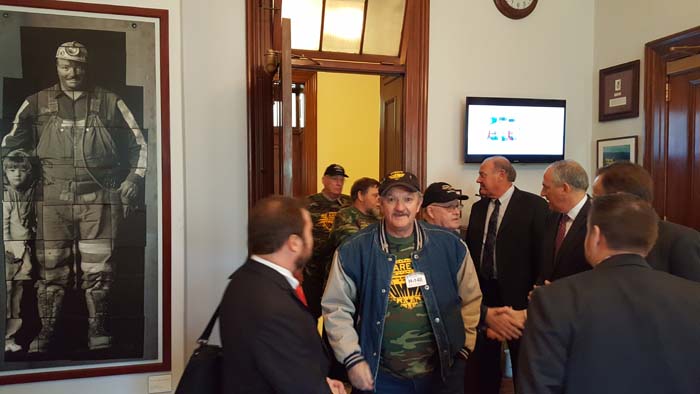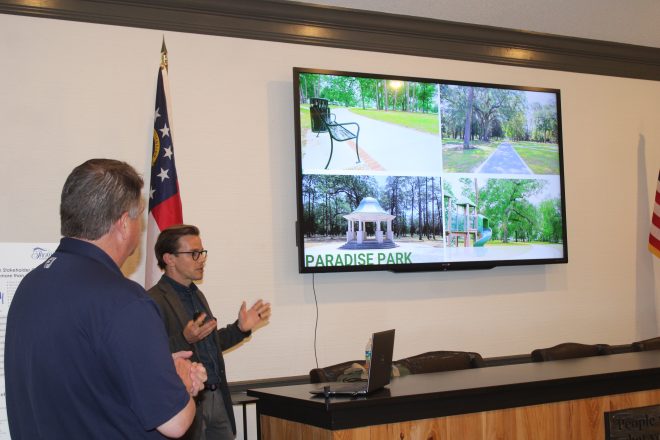Retired coal miners fight to rescue benefits
Published 11:30 am Friday, March 3, 2017

- Retired coal miner Thomas Gibson of Montgomery, West Virginia, leads a delegation of miners into U.S. Sen. Shelley Moore Capito's Capitol office Thursday to push for rescuing their health care and pension benefits.
WASHINGTON — To retired coal miners of America, the thought of losing their safety net — union promised health insurance and pensions — has them on desperation’s edge with Congress.
If they don’t get federal bailout money to make up for these unfunded benefits, they told Capitol Hill lawmakers Thursday, they will face life and death decisions in many cases.
By the dozens, they made their cause personal as they walked the marbled halls. Here are just three cases from lifetime West Virginia miners:
- Ronald Pauley, 58, said his cancer is presently in remission. But he’s terribly worried whether he’ll have sufficient health care if it returns.
- Thomas Gibson, 68, said he’s had a hip replacement and a nerve stimulator embedded in his spine and can’t do without health insurance or his pension.
- Lawson Shaffer, 66, said he has a touch of black lung disease, wears an oxygen mask at night and without his level of health care, his condition will only get worse.
They are among 22,800 retired miners and widows of deceased retirees who received cutoff notices from the United Mine Workers Union Wednesday that their health and pension benefits will end on April 30 unless Congress acts.
This is the third time in two years the miners have received cutoff notices because there are insufficient funds to pay for the benefits. This condition results from a distressed coal industry with few jobs and fewer coal companies, chased from business by cheaper natural gas and stricter government regulations.
Congress has provided temporary relief in the past, but there’s resistance from fiscal conservatives to spending federal dollars on bailing out a private sector union.
The miners said the pension and health care benefits were guaranteed by a 1946 deal between the union and President Harry Truman to end that year’s national coal strike.
Congress included $45 million for the miners in a stopgap funding bill last December. Yet that was only enough to keep the insurance and pension contributions going until the end of April.
The idea was to buy time for a permanent solution. But with time now running out again and no deal in sight, the miners are back making their resolute case for assistance from Washington.
The miners said many of them could still get health care through Medicare and Medicaid if the union benefits expired, but their out-of-pocket costs, including co-payments, would increase dramatically.
For example, miner Shaffer of Montgomery, West Virginia, said the pills he takes every day for his black lung disease would cost about $440 a month, and that’s only for one prescription drug.
“A lot of us are pretty banged up by the time we leave the mines,” said Pauley of Madison, West Virginia. “We’re not looking for a government handout. We’re asking the government to keep its promise.”
Republican Sen. Shelley Moore Capito of West Virginia met with the miners at the Capitol. She’s pushing for temporary funding to get beyond April and set the stage for a permanent fix.
Democrat Sen. Joe Manchin of West Virginia said in a statement Wednesday he’s “furious” the miners received another round of cutoff notices from the United Mine Workers.
The Heritage Foundation, a conservative policy organization, has opposed Capito-Manchin legislation for permanent funding by allocating $3 billion over the next 10 years from the nation’s Abandoned Mine Land Reclamation Program — a pool of money coal companies pay into for cleaning up old mines.
“Forcing taxpayers and these companies’ competitors to bail out the irresponsible choices of pension administrators would be unfair and could set the expectation for a multi-trillion-dollar bailout of private and public pensions across America,” Heritage senior policy analyst, Rachel Greszler, wrote in a blog post last year.
The Congressional Budget Office said the bill would save the federal government $67 million over the decade as it would also raise customs fees to more than pay for the retired miners’ health care and pension benefits.
As time ticks down, supporters of the bill have resorted to legislative gamesmanship to win approval.
Pennsylvania Sen. Bob Casey and 12 other Democrats on the Senate Finance Committee wrote committee chairman Sen. Orrin Hatch, R-Utah, threatening to tie up the waiver needed for President Donald Trump’s nomination of Robert Lighthizer as the U.S. trade representative — unless it was tied to passage of the Capito-Manchin bill.
Casey issued a statement saying he’s “appalled we still haven’t moved forward on a bipartisan, fully-paid for bill. It is impossible to image the stress this has caused these families.”
Miner Pauley represented that angst when asked what he’d do if he lost his health insurance to pay for treatment of his black lung disease.
“I guess I’d just wait for them to build my casket,” he said.
Kery Murakami is the Washington, D.C. reporter for CNHI’s newspapers and websites. Contact him at kmurakami@cnhi.com.





